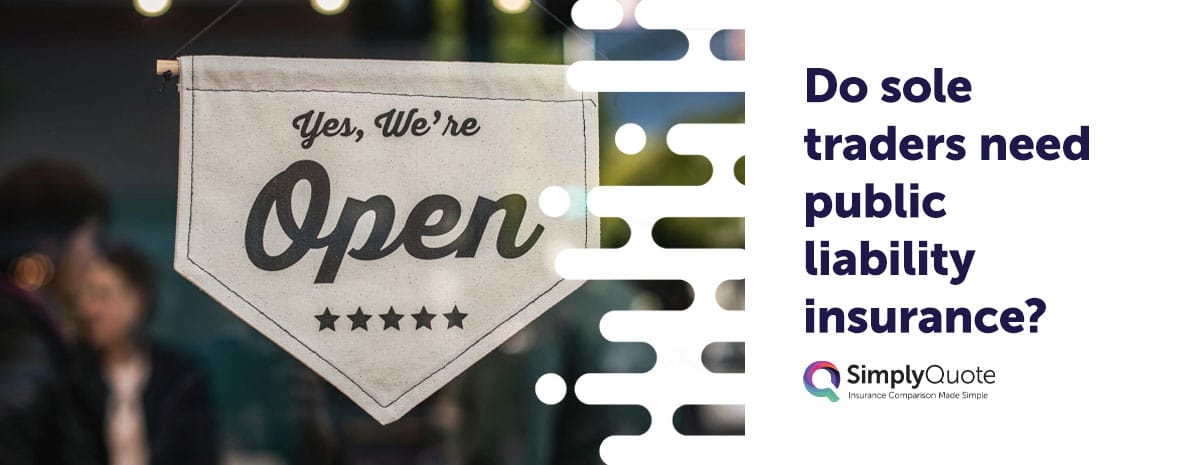Do sole traders need public liability insurance?
Sole traders in the UK are not legally required to have public liability insurance—but if your work involves other people or their property, it’s a smart and often necessary form of protection.
One claim could leave you personally liable for thousands in legal fees or compensation.
Unlike limited companies, sole traders don’t have a legal barrier between their business and personal finances. That means if you accidentally injure someone or damage something in the course of your work, you could be held personally responsible—and that liability doesn’t end with a letter of apology. It could lead to a formal claim, court involvement, and costs that land squarely on you.
Think about your day-to-day: Do clients visit you? Do you travel to their homes, venues, or sites? Do you handle equipment or tools near people or property? If so, you’re carrying a risk. Public liability insurance is designed to cover that risk—whether you’re a mobile hairdresser, a plumber, or a dog walker working in a local park.
You might never need to use it. But if you do, it could be the only thing standing between you and a devastating bill.
In this guide, we’ll explain exactly what public liability insurance covers, whether it’s essential for your type of work, how much it typically costs for sole traders, and how to get the right cover without overpaying. If you’re unsure whether it’s right for you, you’ll find everything you need to make a confident, informed decision.

What is public liability insurance and how does it work?
Public liability insurance protects your business from the cost of claims made by members of the public who are injured or suffer property damage as a result of your work.
It covers legal fees, compensation, and associated expenses—so you’re not footing the bill personally if something goes wrong.
For sole traders, this protection is particularly important. With no company structure to act as a buffer, the financial consequences of a claim fall directly on you. If a customer trips over your equipment, or you accidentally damage flooring in a client’s home, a single incident can spiral into thousands of pounds in costs—regardless of intent.
Policies are typically set up to cover a specific limit—commonly £1 million, £2 million, or £5 million—and may include legal defence costs and out-of-court settlements. If a claim is made, your insurer steps in to handle negotiations, pay eligible expenses, and defend your business if needed.
Want a deeper dive into what this policy includes and excludes? Read our full guide: What Is Public Liability Insurance?
Looking to compare public liability insurance? Get your quote today!
Get QuotesIs it a legal requirement for sole traders in the UK?
Public liability insurance is not legally required for sole traders in the UK—but in many industries, it’s effectively mandatory due to client contracts, venue rules, or trade body membership.
You won’t be fined for not having it—but you might lose work.
There’s no government law that says a self-employed person must carry public liability insurance. However, if you plan to work on public property, attend markets, or sign contracts with local authorities or landlords, it’s often a requirement before you’re even allowed on site. Many clients now ask for proof of cover upfront as part of their own risk management.
If you’re applying for a stall at a market, working as a subcontractor, or teaching fitness classes in a rented hall, not having insurance could disqualify you before you get started. Even one-off events or pop-up jobs often require a minimum of £1 million or £2 million in cover.
So while it’s not a legal tick-box, it is—quite often—a practical gateway to getting paid. For many sole traders, public liability insurance is less about compliance, and more about credibility.
Why is public liability insurance so important for sole traders?
Because sole traders carry full personal liability, even a minor claim can put your business—and your finances—at serious risk.
With no legal separation between your business and personal assets, a compensation payout could come out of your own pocket.
Let’s say a customer trips over your toolkit, a child is injured during an event you’re running, or you scratch a car while carrying out a job. If a claim is made and you don’t have insurance, you’re not just liable—you’re fully exposed. That means solicitor fees, compensation, court costs, and potentially reputational damage, all resting on your shoulders.
This isn’t just about trades and tools. Mobile therapists, dog walkers, makeup artists, even freelance photographers can accidentally cause damage or injury without realising it. One honest mistake could cost more than your annual income.
And then there’s perception. If a client asks “Are you insured?” and you say no, it sends a message—fairly or not—that you’re not operating professionally. Insurance isn’t just about risk. It’s about reassurance. For many sole traders, it’s the difference between being seen as a hobbyist and being trusted as a business.
Which types of sole traders usually need it?
Any sole trader who works in public spaces, enters client homes, hosts people at their premises, or handles tools near property should seriously consider public liability insurance.
Risk isn’t exclusive to high-risk trades—it’s embedded in everyday work.
Here are just a few examples:
- Tradespeople: Builders, electricians, plumbers, decorators—often required to show proof of cover to work on-site or sub for contractors.
- Mobile professionals: Cleaners, gardeners, pet groomers, and dog walkers who carry out work at third-party properties.
- Wellness & beauty providers: Massage therapists, personal trainers, yoga instructors, beauticians—especially those who rent treatment rooms or visit clients at home.
- Creative freelancers: Photographers, videographers, and event organisers working at venues, weddings, or public-facing environments.
Even if you only operate in a low-risk service, ask yourself: Could I accidentally cause harm or damage while doing my job? If the answer’s yes, then public liability insurance is more than just optional—it’s smart protection.
How much does public liability insurance cost for sole traders?
Most sole traders in the UK pay between £50 and £250 per year for public liability insurance, depending on their trade, risk profile, and required cover limit.
The average cost for £2 million of cover is around £118 annually—but your exact price depends on how and where you work.
Low-risk businesses—like personal trainers, domestic cleaners, and home-based consultants—typically pay on the lower end. Higher-risk trades, such as builders, mobile mechanics, or tree surgeons, usually face higher premiums, especially if they need £5 million or £10 million in cover for public sector contracts or event work.
Your premium is influenced by several key factors:
- The type of work you do
- Your annual turnover
- Whether you’ve had previous claims
- How much public interaction your role involves
- The cover limit required by contracts
The good news? Costs don’t scale linearly. Stepping up from £1 million to £5 million of cover often adds just a few pounds a month.
For a full breakdown of typical prices, industries, and cover tiers, read our detailed guide to the cost of public liability insurance.
How can sole traders get public liability insurance?
Sole traders can get public liability insurance online in a matter of minutes by comparing quotes from multiple providers and tailoring the cover to match their trade and risk profile.
Most policies can be bought instantly—without needing a limited company or complex paperwork.
Start by gathering a few basic details:
- Your trade or profession
- Where you work (at home, on-site, mobile)
- Your estimated turnover
- Whether you’ve had any recent claims
From there, use a reputable comparison platform or specialist broker. Many allow you to add extras—like tools cover or personal accident insurance—as part of a custom policy bundle.
You’ll be asked to choose your cover limit (typically £1M, £2M, or £5M). If you’re working with a council, landlord, or large client, check their requirements before selecting. Most won’t accept anything under £2 million—and public sector tenders often ask for £5 million or £10 million.
What other insurance might sole traders need?
Public liability insurance is a smart start—but depending on how you work, you may need other types of cover to fully protect yourself.
Some are optional. Others may be essential if you hire staff, give advice, or rely on equipment.
Here are a few worth considering:
- Professional indemnity insurance – If you offer advice, consultancy, or design work, this covers claims for errors, omissions, or negligence that lead to financial loss.
- Employers’ liability insurance – A legal requirement if you hire anyone, even part-time or casually. Covers injury or illness suffered by employees due to their work.
- Tools cover – Protects the gear you rely on from theft, damage, or loss. Especially valuable for tradespeople and mobile professionals.
- Personal accident insurance – Offers a payout if you’re injured and unable to work. Sole traders don’t get sick pay—this can be a financial lifeline.
- Product liability insurance – If you manufacture or sell physical goods, this covers injuries or damage caused by faulty products.
You may not need all of these—but reviewing your work setup, client expectations, and financial exposure is a smart way to spot the gaps before they cost you.
Final thoughts
Public liability insurance might not be a legal obligation for sole traders—but in today’s working world, it’s often a professional necessity. Clients expect it. Venues require it. And if something goes wrong, it could be the only thing standing between you and a five-figure claim.
As a sole trader, your personal finances are directly on the line. Whether you’re laying flooring, running a fitness class, or visiting homes as a therapist, even the most careful business owners can’t control every outcome. Accidents happen. Insurance catches them.
The good news? It’s affordable, fast to arrange, and tailored to your trade. And once you’re covered, you’re not just protected—you’re better positioned to win work, meet requirements, and show clients you take your responsibilities seriously.
Frequently Asked Questions (FAQs)
Yes. You don’t need a registered business name or company number—your own name and professional role are enough for a policy.
Yes. It’s considered an allowable business expense and can usually be deducted from your taxable income.
You might. If clients visit your home or you handle deliveries, tools, or activities that involve others’ property, it’s worth having.
Yes. Some providers offer short-term public liability insurance for one-off jobs, events, or temporary gigs.
You’d be personally liable for any legal fees, compensation, and court costs. As a sole trader, your personal assets could be at risk.
No. It’s not a legal requirement—but depending on your industry or contracts, it may be practically essential.
Often, yes. Many won’t allow you to operate or trade on site unless you can provide proof of minimum cover (usually £2M or more).
Some policies include limited overseas cover, but not all. Check the territorial limits in your policy or request international extension.
